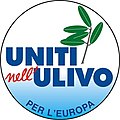The Olive Tree L'Ulivo | |
|---|---|
 | |
| Leader | Romano Prodi (first and last) |
| Founded | 6 March 1995 |
| Dissolved | 14 October 2007 |
| Merged into | Democratic Party |
| Headquarters | via S. Andrea delle Fratte, 16 00186 Rome |
| Political position | Centre-left |
| National affiliation | Ulivo–PRC (1996–98) The Union (2005–07) |
| Colours | Green (official) Red (customary) |
| Website | |
| www | |
The Olive Tree (Italian : L'Ulivo) was a denomination used for several successive centre-left [1] [2] [3] [4] political and electoral alliances of Italian political parties from 1995 to 2007.
Contents
- History
- The Olive Tree coalition
- The Olive Tree list and federation
- Democratic Party
- Electoral results
- Italian Parliament
- European Parliament
- Symbols
- Further reading
- See also
- References
- External links
The historical leader and ideologue of these coalitions was Romano Prodi, Professor of Economics and former leftist Christian Democrat, who invented the name and the symbol of The Olive Tree with Arturo Parisi in 1995. For the 2006 general election The Olive Tree was largely supplanted by a wider Prodi-led alliance called The Union, while The Olive Tree remained a smaller federation of parties which merged to form the Democratic Party in October 2007, which continues to be the lead party of an unnamed centre-left coalition.




